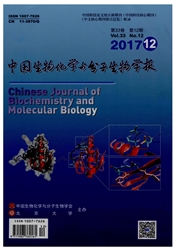

 中文摘要:
中文摘要:
当成人肝细胞发生癌变,甲胎蛋白(alpha.fetoprotein,AFP)在血清中的含量会急剧增加.AFP可与细胞表面AFP结合蛋白(AFP binding protein,ABP)结合促使细胞增殖分化.全反式维甲酸(all—trans retinoic acid,ATRA)通过与特异性维甲酸受体(retinoic acid receptor,RAR)结合发挥抑制肿瘤生长的作用.Western印迹检测肝癌细胞HepG2和HLE中ABP的表达.结果显示,ABP在HepG2细胞中高表达,在HLE细胞中无明显表达.这一结果与2种细胞AFP的表达情况一致.激光扫描共聚焦显微镜定位分析显示,ABP存在于HepG2细胞胞膜和胞浆,用80μmol/LATRA处理HepG2细胞4h,可导致RAR入核增加.用不同浓度(20~160μmol/L)ATRA处理HepG2细胞后培养36h.Western印迹结果表明,细胞ABP的表达随着ATRA浓度的增高而越少,ATRA浓度达80μmol/L时,HepG2细胞的ABP表达减少,ATRA浓度为160μmol/L时,ABP几乎无表达;加入80μmol/LATRA后,随着作用时间延长,HepG2细胞ABP表达逐渐减少,当作用时间为12h时,ABP表达明显减少.结果表明,ABP的表达对ATRA的反应呈剂量和时间依赖性.免疫共沉淀结果表明,AFP、ABP及RAR这3种蛋白质具有互相结合的作用.这些结果为进一步深入研究AFP在肝癌发生过程中的作用机制提供了依据.
 英文摘要:
英文摘要:
Alpha-fetoprotein(AFP) promotes cell proliferation and differentiation via the AFP binding protein(ABP),which was markedly increased in patients with hepatocellular carcinoma(HCC).All-trans retinoic acid(ATRA) binds specific retinoic acid receptor(RAR) and inhibits tumor cells proliferation.ABP was shown by Western blot to be highly expressed in HepG2 cells and distributed in cytoplasm and membrane in Laser confocal microscopy,but it was barely detectable in HLE cells.ATRA of 80 μmol /L resulted in an increase of the nuclei entrance of RAR in HepG2 cells.After ATRA(20 ~160 μmol /L) treatment of HepG2 cells for 36 hours,the level of ABP started to reduced at 80 μmol /L.and diminished at 160 μmol /L.The decline of ABP under 80 μmol /L ATRA treatment was observed at 12 hours in time course studies.Co-immunoprecipitation(CoIP) results showed that AFP,ABP and RAR proteins could interact with each other.Our data provide the basis for further investigation about the role of AFP in the HCC growth.
 同期刊论文项目
同期刊论文项目
 同项目期刊论文
同项目期刊论文
 Elevated serum alpha fetoprotein levels promote pathological progression of hepatocellular carcinoma
Elevated serum alpha fetoprotein levels promote pathological progression of hepatocellular carcinoma KLF6/Sp1 initiates transcription of the tmsg-1 gene in human prostate carcinoma cells: an exon invol
KLF6/Sp1 initiates transcription of the tmsg-1 gene in human prostate carcinoma cells: an exon invol Alpha-fetoprotein acts as a novel signal molecule and mediates transcription of Fn14 in human hepato
Alpha-fetoprotein acts as a novel signal molecule and mediates transcription of Fn14 in human hepato Mechanisms involved in phosphatidylinositol 3-kinase pathway mediated up-regulation of the mu opioid
Mechanisms involved in phosphatidylinositol 3-kinase pathway mediated up-regulation of the mu opioid The mechanism involved in the repression of the mu opioid receptor gene expression in CEM x174 cells
The mechanism involved in the repression of the mu opioid receptor gene expression in CEM x174 cells Elevated serum alpha fetoprotein levels promote pathological progression of hepatocellular carcinoma
Elevated serum alpha fetoprotein levels promote pathological progression of hepatocellular carcinoma The Role of Transcription Factors Sp1 and YY1 in Proximal Promoter Region in Initiation of Transcrip
The Role of Transcription Factors Sp1 and YY1 in Proximal Promoter Region in Initiation of Transcrip The mechanism involved in the repression of the mu opioid receptor gene expression in CEM x 174 cell
The mechanism involved in the repression of the mu opioid receptor gene expression in CEM x 174 cell Elevated serum alpha fetoprotein levels promote pathological progression of hepatocellular carcinoma
Elevated serum alpha fetoprotein levels promote pathological progression of hepatocellular carcinoma 期刊信息
期刊信息
